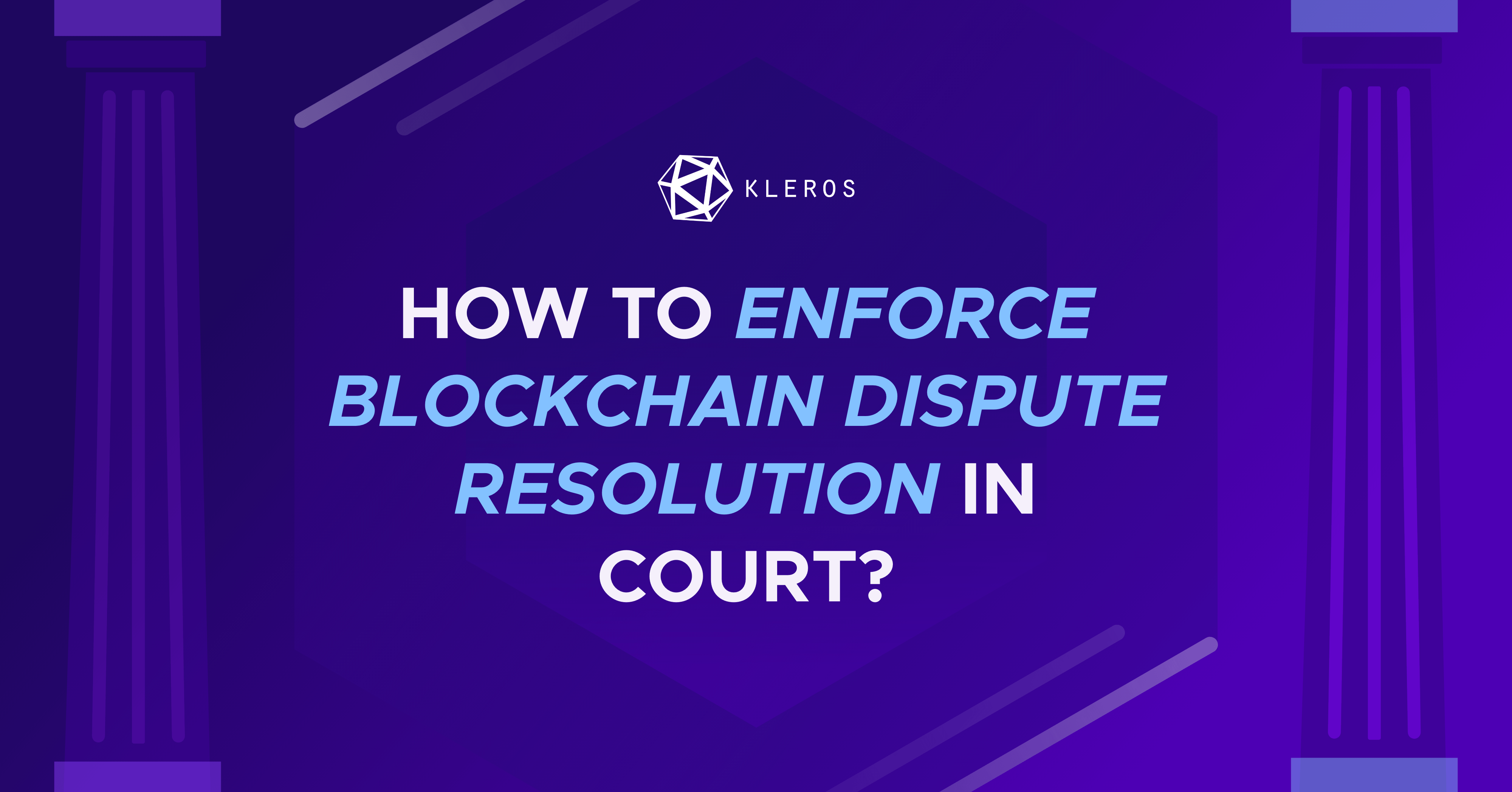How to Enforce Blockchain Dispute Resolution in Court? The Kleros Case in Mexico

By Mauricio Virues*
Some of the most challenging questions in the e-arbitration world are related to blockchain dispute resolution and its possibility to render enforceable decisions before courts and traditional institutions.
The most common view seems to be that the lack of a blockchain structure in a smart contract fashion will most likely lead to non-enforceable decisions.
The trend to counter this inconvenience of blockchain arbitration seems to focus on two complementary strategies:
- The first one is to maximize on-chain arbitration in every possible way, accelerating the development, functionality, and accessibility of smart contracts to decentralize legal arrangements and relationships as fast and as much as possible.
- The second strategy is to promote legislative and governmental actions to modernize legal frameworks, aiming to accommodate e-arbitration within ranges that are workable for local courts and jurisdictions.
Should E-arbitration be Radically Decentralized?
This is a debate that has been going on for quite some time.
In spite of the technological advancement in blockchain applications and smart contract possibilities, it still seems that the most significant part of legally relevant social relations and exchanges will keep running through traditional dispute resolution schemes (typically, civil justice systems, managed by conventional rules, courts and judges).
As smart contracts become more widespread, it will be more likely to see an all-out legal battle about the extent to which formal justice systems should exert control over blockchain encoded contracts.
As these processes unfold and the stage becomes ready for a significant battle of centralization versus decentralization, both law and technology professionals are presented with the opportunity to introduce new forms of dispute resolution into traditional methods of justice delivery, from private arbitration to court adjudication.
In this context, an interesting question to address is:
Can we have blockchain dispute resolution recognized and enforced in a real-world courtroom with our current legal frameworks?
A recent case using Kleros dispute resolution protocol shows that it is indeed possible.
A Decentralized Arbitration Clause in a Leasing Contract in Mexico
On September 1st, 2020, two parties decided to include an arbitral clause in a real estate leasing contract governed by Mexican law. This was a standard clause where parties appointed an arbitrator and set the arbitration rules in a traditional "New York Convention" way.
Nonetheless, the novelty of this particular arbitral clause was that the parties instructed the arbitrator to use the Kleros protocol to govern the substance of the award, underpinning a sort of hybrid concept of arbitration, according to which it is possible to have "traditional arbitrators" conducting the proceedings while using decentralized protocols and technological tools (cyberjuries, artificial intelligence, or any other technology that could be used to facilitate dispute resolution) actually to settle the substantial controversy.
In this case, when a dispute arose, the parties commenced the arbitral proceeding, both presenting their respective claims and evidence. The appointed arbitrator drafted and sent a procedural order to Kleros, which ran its protocol and delivered a decision about the substance of the litigation, deciding in favour of the landlord. This decision was used as the crucial criterion for the arbitral award rendered and signed by the arbitrator and sent to the parties in a traditional fashion.
Will this Hold in Court?
The real test came when the arbitral award had to be presented before a court of law to get recognized and enforced. Naturally, the local court had no precedent of this (it is even fair to say that, at a local level, there was little or even no judicial standard in terms of private arbitration, which is rarely used in the Mexican legal environment).
Fortunately, the court did a remarkable job going through the legal nature of the arbitral award that it was presented with and having checked that neither the arbitral clause nor the proceedings were in any way opposite to any statute, it recognized the award and ordered its enforcement by means of public force.
This is how, for the first time, a Mexican court recognized and enforced an arbitral award that was substantially governed not by the arbitrator's judgement alone but rather by a technological tool designed for decentralized dispute resolution: the Kleros protocol.
Moving Forward
This case outlines several exciting issues in terms of e-arbitration. Perhaps the most interesting aspect is that it shows that blockchain dispute resolution schemes can be accommodated within "traditional" arbitration even in the lack of updated legal frameworks.
This can be achieved by considering dispute resolution technologies not as a whole, complete system but rather as tools that litigant parties can choose as decision-making instances within whatever dispute resolution method they prefer.
In a sense, such as an arbitrator, the seat of arbitration or the applicable laws for arbitration, decision-making technology can become part of the many options that private parties can decide through their contractual autonomy.
There is no doubt that smart contracting, on-chain dispute resolution and decentralization will keep advancing and are very likely to eventually become the main form of economic exchanges and legally relevant relations.
However, it remains unclear how long will it take for these changes to occur at significant levels, as well or the extent to which traditional structures will eventually fight back decentralization efforts.
In this scenario, it is interesting to explore how much can be achieved in terms of accommodating dispute-resolution technologies within current legal frameworks, with no need for profound legal reforms or changes in terms of social or economic interactions.
Discreetly incorporating dispute-resolution technologies into our traditional civil justice systems would be an excellent way to soft-land LegalTech in many jurisdictions, possibly making a pivotal contribution to its future legitimacy and acceptance, something that could result fundamental for the debates to come.
*Mauricio Virues is an attorney who graduated with honors from Universidad Panamericana. He holds a Master in Constitutional Justice from Universidad de Guadalajara and is member of the 2019-2020 class at the LLM in Litigation and Dispute Resolution at the University College London (UCL). He is Founder and Director of a leading Mexican law firm with a specialized practice in Civil Justice and Alternative Dispute Resolution. Mauricio is a graduate from the Kleros Fellowship of Justice.
To learn more about the case in Mexico, download the full report including the arbitration clause and court documents and watch the official announcement video.

